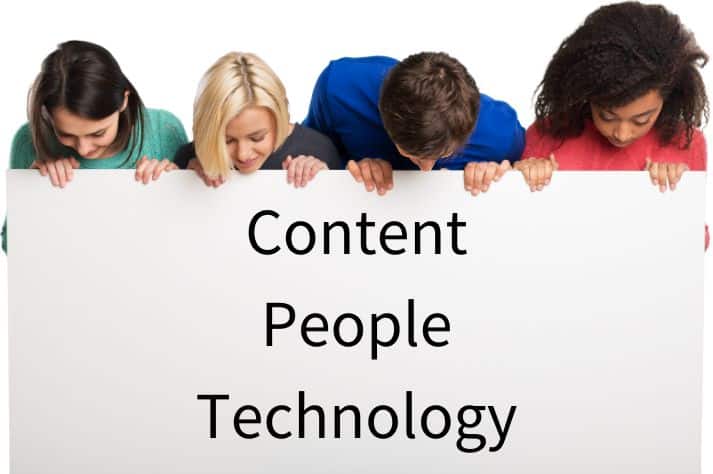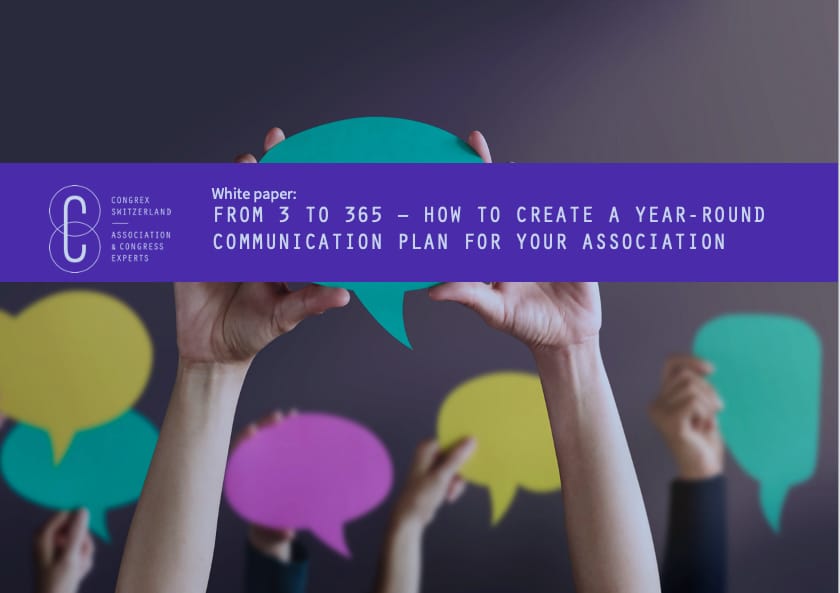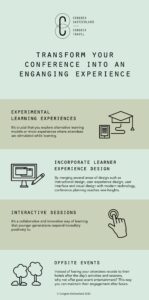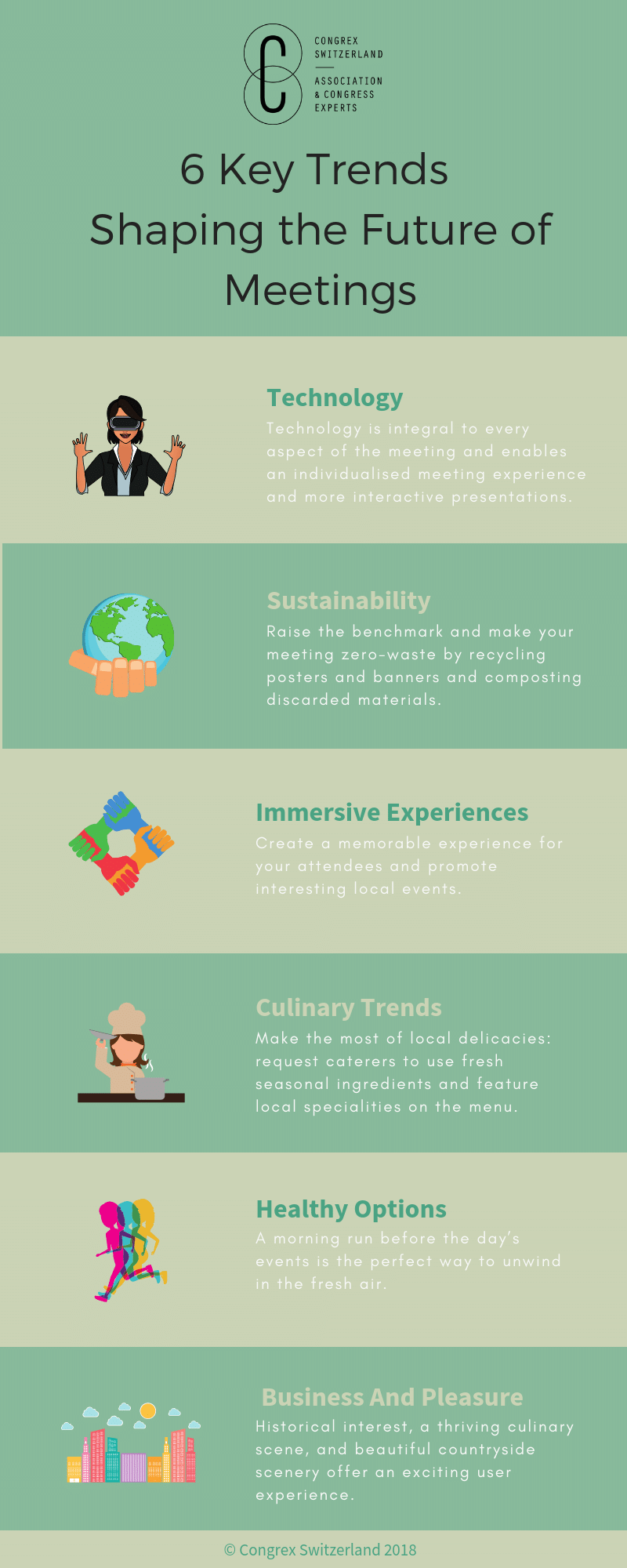Conference Planning Guidelines 2023
The event planning industry continues to evolve and adapt to new challenges and changing expectations. This article offers updated guidelines to help conference-organising committees plan a successful and profitable conference.
An updated approach to the conference planning process

Organising an event involves a time-sensitive step-by-step process, which can be outlined as follows:
Defining stage (10 to 12 months)
- Defining financial goals
- Defining budget
- Defining topic
- Deciding on a format (hybrid, in-person, entirely online)
- Securing sponsorships
- Creating a planning team
Planning stage (8 to 10 months)
- Date
- Location
- Venue
- Conference Agenda
- Confirming speakers
- Reaching out to suppliers
Branding & Advertising stage (8 months to event date)
- Starting marketing the event
- Setting up the event website
- Opening registrations
Although all these steps are required, we suggest an updated approach to the conference planning process in this article. The approach targets three core factors of a professional meeting, namely:
- Content includes the conference theme, promotional materials, and online content published on the conference website and social media.
- People, which covers everything from keynote speakers to conference attendees and includes the in-house planning team and any external staff.
- Technology, including tools to support the conference agenda, ranging from the on-site audio-visual setup to the tech systems used to register attendance.
These elements are essential to conference success and underscore other planning-related decisions, such as venue, date, logistics, etc. Let’s look at each factor in detail.
Critical Factors to Planning a Successful Conference
Content
Conference topic
Planning a successful conference starts with choosing a relevant topic. This will ensure that all content is appealing to your target audience.
A relevant conference theme is timely and considers the industry’s latest developments. Also, it is professionally applicable to delegates. The topic must attract attendees, offer value to different profiles, and be predominantly actionable.
Remember that the more relevant a topic, the more profitable a conference will be, so plan this aspect considering the event’s financial goals.
Content Format
To ensure content is interactive and engaging, plan to feature a mix of session formats, ensuring they are adequate for the content.
Some topics are better suited to round tables or panel discussions, others to traditional presentations or seminars, and others are best delivered via live demos.
Online content
For optimal efficiency and consistency, online content should be scheduled on a calendar that targets at least the following promotion channels:
- Event website
- Social media
- Email marketing
Social media (particularly LinkedIn and Twitter) can help generate attention around the event. In addition, plan press releases and ad content to complement your online strategy.
All content published on online channels should highlight the value your event will offer and spell out the real-life benefits of attending.
Related: Content Marketing Methods for Event Marketing Outcomes
People
Speakers
- The right speakers will elevate your event. To gather a stellar list of names, plan a multi-method approach:
- Publish an RFP on your website and social media channels and send it via your newsletter or subscriber emails.
- Look at recent industry publications to gather some names.
- Proactively look for suitable matches using LinkedIn’s search function. You can search for leading names in your industry, go through existing connections, or search for professionals who have listed “speaker” or “keynote speaker” in their titles or bio.
- Lastly, survey previous years’ attendees to see whom they would like to have as speakers in this year’s line-up.
Conference attendees
In specific industry sectors, the typical attendee profile may have changed or may not apply any longer due to the effects of the Great Resignation and its implications for the corporate world. On the other hand, you may have new prospects to engage, so research is a must.
The key is understanding what type of insights would transform your audience and ensuring you cater to different needs and profiles.
Related: Six attendee profiles and what they expect from a conference
In-house & external teams
Create a project management team early in the conference planning process, outlining which team members will do what and when.
Equally important is ensuring a smooth relationship between the in-house team and external contractors, suppliers, and volunteers. It is crucial to ensure they share a common vision and have the right communication tools.
Related: How to organise a conference with roles defined
Successful conference logistics greatly depend on this, so gather direct feedback from everyone involved. Find out what they need to do their job, what issues they have struggled with, and define the procedures to follow if something goes wrong.
Sponsors
Create a database with potential sponsors using a sponsor marketplace or leads from previous years’ events. It may help to segment the database targeting different aspects of the event (awards, technology, F&B, travel and hospitality, media, etc.).
Also, have a sponsorship package ready for each applicable option, which spells out your shared vision, what you can achieve together, and the value you will create for the sponsor.
Networking and interaction
Networking opportunities remain a big reason to attend a conference. In the past, attendees were expected to do all the leg work to research opportunities and arrange meetings. Nowadays, thanks to technology, expanding business connections is an integral part of a conference and only requires a few taps of the screen.
To facilitate networking:
- Choose a venue and layout that encourages rich human interaction.
- Choose an event app with matchmaking, communication and meeting booking features.
- If your conference is hybrid, ensure your virtual breakout rooms are available.
Technology
- The tech foundations of conference planning are:
- A project management tool
- An event website
- Software to handle registrations & check-ins
- A CRM to manage processes and communications with speakers, attendees, sponsors, etc.
Related: How digital transformation can elevate your conference planning
Pre-conference tech
The conference website should clearly display key event information, and it’s also an excellent place to promote your event. Create a content calendar featuring a mix of FAQs, video interviews with speakers or previous years’ attendees, articles covering the destination, social media links, mentions to sponsors, etc.
Social media automation tools can streamline the event promotion process and help boost registration figures.
It would help if you also had a reliable email marketing tool to segment your contact list and send personalised messages. Remember to include short video messages to make emails engaging.
During the conference
The suitable event app can handle critical tasks, from virtual help desk functions to branding matchmaking, including live Q&As, polls, social walls, live and on-demand streaming, personalised notifications, and gamification.
Conference tech choices also depend on whether the event will be available in multiple formats. Even if you are not planning a hybrid conference, it may be worth including some simulive (webinar) sessions with a live intro and outro or virtual Q&A at the end.
Related: Latest Event Technologies
Post-conference tech
During the planning stage, look for a tech solution that facilitates integration between the event app and your CRM so that you can use insights and event data to your advantage.
The chosen tech tools should allow you to conduct critical post-conference activities, including:
- Compiling event data.
- Creating and sending event highlights and/or a summary of resources.
- Sending surveys to delegates to thank them and gather feedback.
- Analysing data to draw actionable conclusions for future events.
Conference Planning Checklist
- Define financial goals and budget.
- Choose topic
- Decide on format
- Decide on registration fees
- Create an event planning team
- Decide if you will work with a PCO
- Choose the date, venue and location
- Create sponsorship packages
- Contact potential sponsors
- Decide on tech tools
- Contact suppliers & vendors
- Create attendee profiles
- Call for submissions or proactively contact experts
- Line up speakers
- Create conference programme
- Issue press release
- Decide on the pricing model
- Create a content marketing calendar
- Launch event website
- Launch event social media pages
- Launch marketing and promotion activities
- Open registrations
- Test the event app
- Order printed or promotional materials
- Do a technical test run at the venue
- Confirm vendors have the details they need to deliver their services
- Email attendees with the final instructions
Conclusion
In 2023, conference planning guidelines revolve around content, people, and technology. Targeting these aspects and following the tips offered in this article can simplify the process and make it more effective, ensuring your meeting stands out.
If you need help planning your next conference, contact the PCO experts at Congrex.











